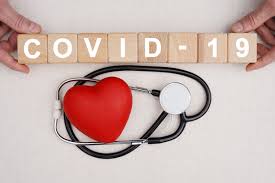Heart Health and COVID-19 Recovery
October 26, 2022
There is growing concern that COVID-19 affects heart health even if the symptoms of infection are not severe. Studies suggest that regardless of the severity of COVID-19 illness, many people have suffered some degree of cardiac injury. This includes those who have had no previous cardiac history. As recently as early February, the American Heart Association reported that almost 25% of hospitalized patients with COVID-19 suffered a cardiac issue. This contributed to approximately 40% of all COVID-19 associated deaths. Complications seen in patients with COVID-19 include inflammation of the heart, often caused by a virus. This can effect the heart’s pumping ability and result in abnormal heart rhythms and eventually heart failure.
A study documented by JAMA Cardiology revealed heart abnormalities in the MRI imaging of 78 of 100 patients who had recovered from COVID-19 in the previous two to three months, and 60% had persistent inflammation of the heart. Additionally, 76% of the patients showed signs indicative of heart damage. Despite these findings patients’ overall heart function seemed uncompromised and most were not hospitalized. Reassuringly, cases with heart inflammation have been observed to resolve without intervention as in cases involving other viruses. Dr. Leslie Cooper, a Mayo Clinic cardiologist stated in an article published February 5, 2021;
COVID-19 doesn’t usually affect the heart. Older hospitalized patients who have severe systemic illness can also have signs of cardiac damage. Sometimes these are asymptomatic, with only an increase in blood markers of injury like troponin, and sometimes patient(s) may have symptoms with chest pain, trouble breathing or sometimes arrhythmia. She further states that if the cardiac effects are severe, this can lead to permanent heart damage. Dr. Cooper shared that it’s not usual for heart inflammation to develop during COVID-19 infection and cardiac compromise can be due to other complications, such as clots in the heart’s small blood vessels or fluid overload. She concluded that hospitalized patients who recovered after severe COVID-19 illness may continue to have an enhanced risk for cardiovascular issues in the long run.
Additional studies are needed to identify risk factors, long term effects, and routine cardiac screening recommendations for those who have been infected with COVID-19. Meanwhile, if you’re recovering from COVID-19, it’s important to frequently self-monitor for cardiac related symptoms and contact your physician, or cardiologist or call 911 if you’re experiencing a cardiac emergency. Even if you have recovered from COVID-19 without any apparent heart effects or complications, it’s also recommended to discuss any concerns about heart health with your physician. Lastly, the COVID-19 vaccine, if appropriate for you as determined with your physician, is the best way to protect your heart and overall health against severe COVID-19 infection.
Please note due to the rapidly evolving nature of COVID-19, and related treatment and studies, the facts and recommendations within this article may have changed since publication.




